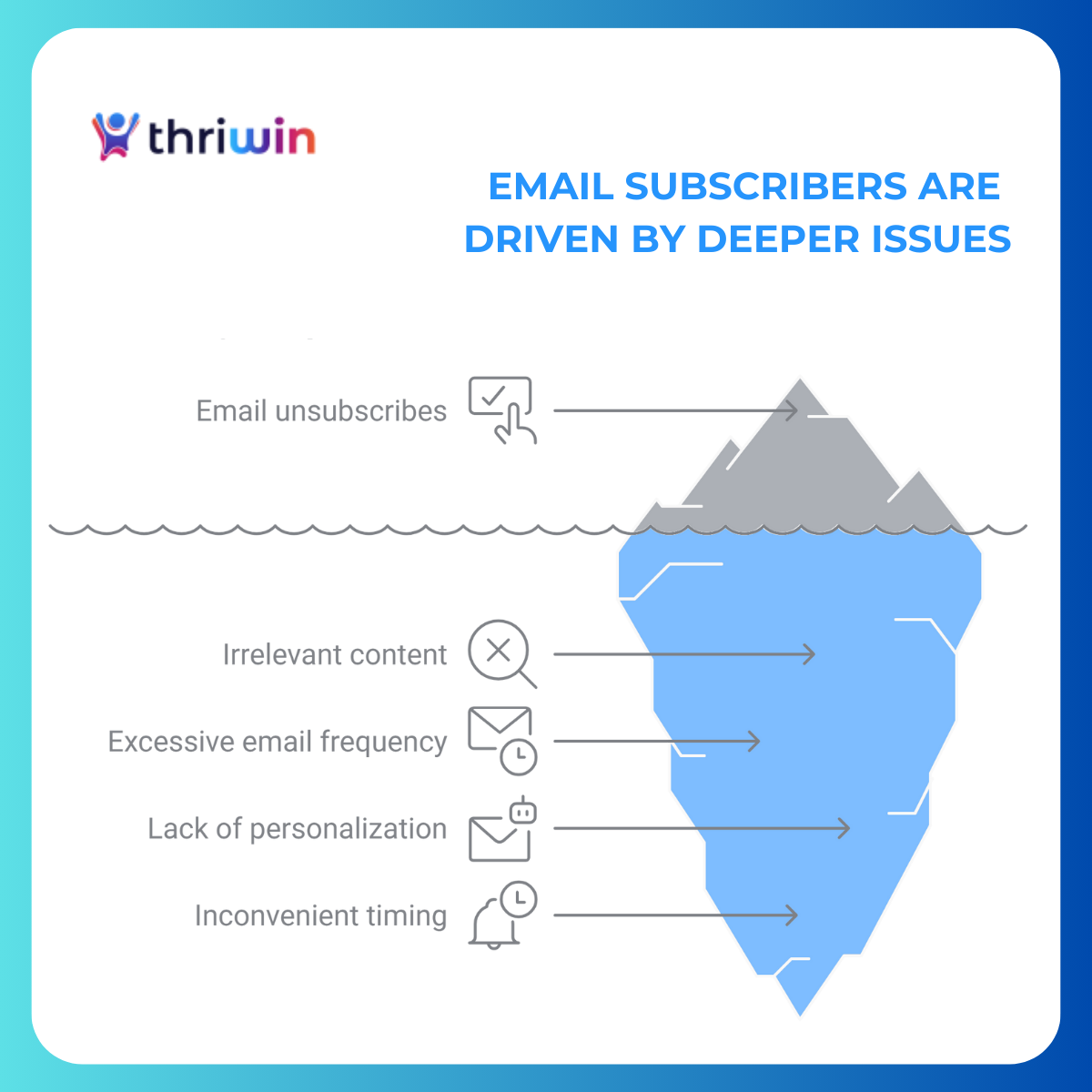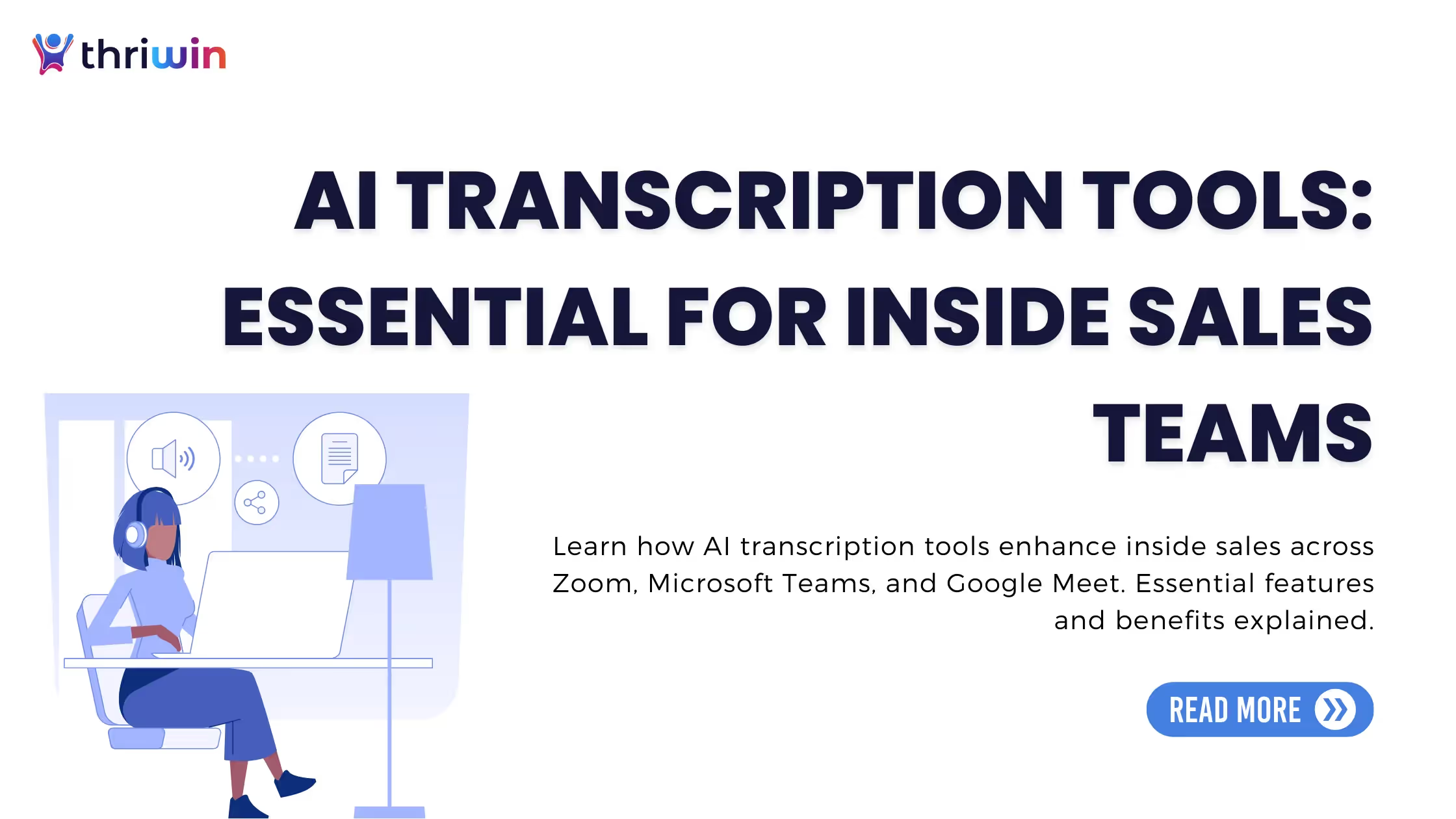Email marketing remains a high-performing channel for customer acquisition and engagement. However, a significant challenge remains: how to reduce opt-outs and complaints from your subscriber base. Despite sending relevant content, many marketers find their campaigns result in high unsubscribe rates, negative feedback, and even lost revenue.
So, how can you ensure your email campaigns are both practical and compliant, without irritating your audience? The solution lies in leveraging email agents—AI-powered tools that help businesses optimize consent validation, personalize email cadence, and detect signs of fatigue before they escalate.
In this article, we will explore how email agents can mitigate email opt-outs and complaints by automating key processes, enhancing subscriber engagement, and ensuring email marketing compliance. Additionally, we will examine how AI-driven solutions, such as those implemented by Thriwin, are revolutionizing the way businesses conduct email marketing and enhance customer relationships.
The Growing Challenge of Email Opt-Outs
High opt-out rates can have serious consequences, damaging both your email deliverability and your overall brand reputation. When subscribers unsubscribe or mark emails as spam, not only does it affect the effectiveness of your campaigns, but it can also lead to poor inbox placement, resulting in lower visibility for future emails.
Why Do Subscribers Opt-Out?
Understanding why subscribers opt out is essential for fine-tuning your email strategy. The top reasons include:
- Irrelevant Content: Subscribers may unsubscribe if the emails they receive don’t match their interests, resulting in disinterest and a higher chance of email opt-outs.
- Excessive Email Frequency: Too many emails can cause subscriber fatigue. When recipients feel overwhelmed by frequent messages, they are more likely to unsubscribe.
- Lack of Personalization: Generic emails that fail to address individual preferences and needs tend to be ignored, resulting in higher opt-out rates.
- Poor Timing: Sending emails too frequently, at inconvenient times, or without considering the recipient's time zone can lead to dissatisfaction, resulting in unsubscribes.

How Email Agents Validate Consent and Build Trust
In email marketing, obtaining explicit consent is not only a legal requirement but also a key element in building trust with your audience. Without proper permission, your emails may be perceived as intrusive or even violate privacy regulations, such as GDPR and CAN-SPAM. Email agents help streamline and automate the consent process, ensuring it’s not only smooth and transparent but also fully compliant with these regulations, minimizing legal risks while fostering stronger customer relationships.
The Importance of Explicit Consent
Explicit consent goes beyond the initial opt-in email marketing; it’s about maintaining ongoing clarity and communication throughout the subscriber’s journey. Both GDPR and CAN-SPAM highlight the importance of proper consent management to protect customer privacy and rights.
- GDPR requires consent to be “freely given, specific, informed, and unambiguous.” This means subscribers must clearly understand what they are signing up for and must have an easy way to agree to receive marketing communications. Failing to comply can result in fines of up to €20 million or 4% of global turnover.
- CAN-SPAM, while not requiring prior consent, mandates an opt-out mechanism and strict adherence to removing unsubscribed users. Violating this regulation can lead to penalties of up to $53,088 per violation.
By automating the consent process, email agents ensure that subscribers' preferences are appropriately recorded and managed, guaranteeing compliance and aligning with best practices.
Mechanisms for Validating Consent
Email agents offer several effective mechanisms for managing and validating consent:
- Double Opt-In: After a subscriber opts in, a follow-up email asks them to confirm their subscription. This ensures that only those who genuinely want to receive your emails are added to your list. This step not only validates consent but also ensures that your communications are welcomed and appreciated.
- Consent Logs: Email agents automatically maintain logs of consent, including the date, time, and method used for confirmation. These logs are crucial for compliance during audits and inspections.
- Periodic Re-Consent: Preferences can change over time. Email agents prompt subscribers to reconfirm their interest (e.g., annually) periodically. This ensures your list remains accurate and compliant with evolving consent requirements.
Reducing Complaints with Validated Consent
By automating consent validation, email agents eliminate the risk of human error, ensuring only interested recipients remain on your email list. This proactive approach prevents sending emails to uninterested individuals, which can lead to complaints and high opt-out rates.
Additionally, email agents enhance transparency by making it easy for recipients to see what they’ve signed up for, how they can manage their preferences, and how they can opt out at any time. This not only reduces complaints but also helps build trust and loyalty with your audience.
Building Trust with Transparent Practices
The consent process isn’t merely about legal compliance—it’s a key opportunity to build trust with your subscribers. Here’s how:
- Clear Communication: Clearly explain what subscribers are consenting to, whether it’s newsletters, promotions, or transactional emails. Providing this information upfront fosters transparency and helps build trust.
- Easy Opt-Out: Ensure that subscribers always have the option to opt out or update their preferences easily. This not only reduces the likelihood of complaints but reinforces that your brand values customer autonomy.
- Data Protection: Safeguarding subscriber data is paramount. Email agents help ensure compliance with privacy regulations, thus strengthening customer trust by protecting sensitive information.
How Email Agents Help Prevent Legal Risks
Compliance with email marketing regulations is crucial for businesses. Email agents streamline this process by automating consent tracking, managing opt-in email marketing and email opt-outs, and generating compliance reports.
With email agents in place, businesses can confidently align their marketing efforts with legal requirements, significantly reducing the risk of costly penalties while maintaining customer trust.
Tailoring Email Cadence to Minimize Fatigue
Email fatigue is one of the primary reasons for email opt-outs. It occurs when subscribers feel inundated with too many emails, which can lead them to disengage and unsubscribe.
Email agents solve this issue by adjusting the frequency of emails based on the recipient’s engagement with previous messages. By constantly analyzing data, email agents fine-tune email cadence to meet the individual needs of each subscriber, ensuring that no one feels overwhelmed by frequent communication.
How to Optimize Frequency with Email Agents
While marketers can manually control email frequency, email agents provide a more scalable and intelligent solution by using algorithms that analyze subscriber behavior (such as email opens and clicks). This allows email agents to adjust the frequency of emails sent to individual recipients dynamically.
For instance:
- Increased Engagement: If a subscriber frequently opens your emails, the agent can send more relevant content at a slightly higher frequency.
- Reduced Engagement: If a subscriber’s engagement starts to drop, the agent will decrease the frequency of emails to avoid overwhelming them with too much communication.
- Re-engagement: If an engagement dip is significant, the agent may initiate a re-engagement campaign to encourage the subscriber to update their preferences or confirm their continued interest in receiving emails.
AI-Driven Personalization of Email Cadence
Personalization in AI-driven email marketing is key to reducing fatigue. AI-powered email agents go beyond merely adjusting the timing and frequency of emails—they can also tailor the content to individual preferences. For example, suppose a subscriber opens emails more frequently in the evenings. In that case, the email agent can schedule future emails to be sent during those hours, ensuring that the content remains timely and relevant.
Detecting and Addressing Fatigue Signals
Fatigue signals are indicators that a subscriber is beginning to disengage with your emails. These signals might include:
- Decreased Open Rates: A gradual drop in open rates often indicates that the subscriber’s interest is waning, signaling a potential for opt-out.
- Increased Unsubscribes: A rise in unsubscribes indicates possible overexposure to emails or irrelevant content.
- Negative Feedback: If subscribers flag your emails as spam or provide negative feedback, it’s a clear sign that your communications are no longer valuable to them.
Proactively Addressing Fatigue with Email Agents
When an email agent detects fatigue signals, it can take immediate corrective action. This could include:
- Reducing the frequency of email sends.
- Altering the content of emails to better align with the subscriber’s interests.
- Giving recipients the ability to adjust their communication preferences (e.g., email frequency, types of content).
Data-Driven Decisions to Prevent Fatigue
The ability to detect and address fatigue proactively is a significant advantage for email marketers. Email agents use behavioral data to anticipate when a subscriber is likely to disengage, allowing marketers to make adjustments before it results in an unsubscribe. This data-driven approach ensures that subscribers remain engaged and receive the right content at the optimal time.
Thriwin's Approach: Optimizing Email Marketing with Email Agents
Thriwin’s AI-powered solutions optimize both sales outreach and customer engagement by ensuring that email marketing campaigns are not only practical but also compliant with relevant regulations. By integrating email agents into its outreach strategy, Thriwin has improved the personalization and relevance of its email content, which in turn boosts engagement rates and reduces opt-outs.
Thriwin’s approach focuses on automating consent management, refining email cadence, and detecting early signs of fatigue—all to maintain a healthy and engaged email list.
Why Thriwin’s Approach Matters
With AI at the core of its email marketing strategy, Thriwin delivers scalable, compliant, and highly personalized campaigns. This approach yields improved engagement, reduced unsubscribes, and stronger customer relationships, ultimately enhancing the ROI of email marketing campaigns.
Conclusion: Transforming Email Marketing with Email Agents
The challenges of managing email opt-outs and complaints are becoming increasingly complex as subscriber expectations evolve. Email agents offer an effective solution by automating consent management, optimizing email frequency, and detecting fatigue signals before they escalate. These AI-powered tools provide a proactive, data-driven approach to email marketing, enabling brands to maintain engaged and loyal subscribers while reducing email opt-outs and complaints.
For businesses looking to scale their email marketing efforts while respecting subscriber preferences, email agents represent a crucial step towards more effective, personalized communication. As the need for personalization and relevance continues to grow, incorporating AI into your email marketing strategy is a key factor in building long-term customer relationships.
Ready to Optimize Your Email Strategy?
If you’re ready to take your email marketing to the next level, adopting email agents can help reduce opt-outs, improve engagement, and foster stronger relationships with your subscribers. Explore Thriwin’s AI-powered solutions and see how we can assist you in optimizing your campaigns. Book a demo now!
FAQs:
What is opt-in email marketing?
Opt-in email marketing refers to obtaining explicit consent from subscribers to receive marketing emails. This process ensures that recipients genuinely want to receive communications, which helps reduce complaints and opt-outs.
How can email agents reduce opt-outs?
Email agents help reduce email opt-outs by automating the consent process, adjusting email cadence to fit individual preferences, and detecting fatigue signals early, ensuring that emails are always relevant and timely.
What are fatigue signals in email marketing?
Fatigue signals include indicators like declining open rates, increased unsubscribes, or negative feedback. These signals suggest that a subscriber is losing interest or becoming overwhelmed by the frequency of emails.
How do email agents detect fatigue?
Email agents monitor user behavior, such as open rates and click-through rates, to detect fatigue. When engagement decreases, the agent adjusts the email cadence or content to prevent further disengagement.
Why is consent validation important in email marketing?
Consent validation is crucial to ensure compliance with privacy regulations, such as the GDPR. It helps build trust by confirming that recipients genuinely want to receive your emails, reducing the chances of complaints or unsubscribes.
%201.svg)





